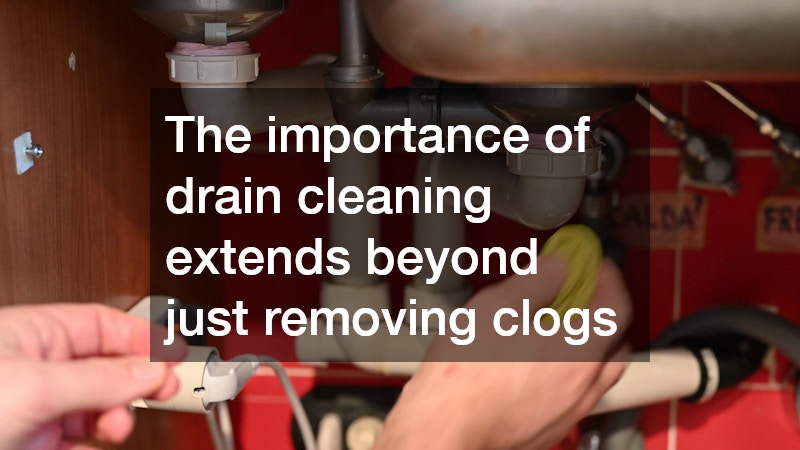Explore the essential aspects of your local drain cleaning service, its significance, and what you can expect during the process. Proper maintenance of home plumbing systems is crucial for ensuring long-term efficiency and preventing costly repairs. By understanding how local drain cleaning services work, homeowners can make informed decisions about when and how to schedule cleanings, ultimately protecting their home investment.
The Importance of Drain Cleaning
Drain cleaning involves removing obstructions and buildup from the pipes connected to sinks, toilets, bathtubs, and other household fixtures. This service is essential because over time, drains can accumulate debris such as hair, soap scum, grease, and mineral deposits, which can lead to slow drainage or complete blockages. Regular drain cleaning helps maintain proper water flow and prevent potential damage to your plumbing system.
The importance of drain cleaning extends beyond just removing clogs. It significantly reduces the risk of malfunction and prolongs the lifespan of plumbing fixtures and pipes. In addition, clean drains can help enhance indoor air quality by reducing foul odors caused by trapped waste and biological growth. By investing in regular drain maintenance, homeowners can avoid disruptive plumbing emergencies and enjoy a cleaner living environment.
Additionally, drain cleaning is beneficial for the environment. When pipes are free of blockages, water is used more efficiently, and unnecessary wastewater is minimized. This conservation is particularly important in areas prone to drought or with limited water resources. Thus, keeping your drains clean not only preserves your home’s plumbing system but also contributes to sustainable water usage.
How Professionals Determine the Right Cleaning Method
Professionals begin by assessing the type and extent of the blockage or buildup. This initial examination often involves visual inspections or the use of specialized cameras to check the condition of the pipes. The material of the pipes, as well as the age and layout of the plumbing system, can also influence how experts decide on the most suitable cleaning approach.
In some cases, professionals may decide to use chemical cleaners, especially if the buildup involves organic materials like hair or grease. However, they must carefully consider any potential adverse effects on certain types of pipes, such as older metal ones that may corrode under harsh chemical exposure. Environmental regulations and homeowner preferences for eco-friendly solutions also play a critical role in selecting cleaning agents.
Another commonly employed method is mechanical cleaning, which involves using tools like augers or snakes to manually break up and remove obstructions. High-pressure water jetting, known as hydro-jetting, is another effective technique used to clear more stubborn blockages and clean the inner surfaces of pipes. These methods are chosen based on the specific needs of the plumbing system, ensuring effective and safe removal of debris.
How Often to Schedule Drain Cleaning
The recommended frequency for scheduling drain cleaning services largely depends on the age and condition of your plumbing system, as well as your household habits. For most homes, a professional drain cleaning every one to two years is sufficient to prevent major clogs and maintain optimal water flow. Households that frequently use garbage disposals or those with hard water conditions may require more frequent cleanings to manage additional buildup proactively.
Preventative drain maintenance should be tailored to your specific needs and local environmental factors. If your home is located in an area with high mineral content in the water supply, routine cleanings can help mitigate the effects of scaling on your pipes. Similarly, homeowners with larger households or those who regularly entertain guests might opt for more frequent maintenance to address increased usage and prevent strain on the drainage system.
In addition to professional services, adopting regular self-maintenance practices can extend the time between cleanings. By avoiding the disposal of fats, oils, and fibrous materials down your drains, you can reduce the risk of buildup and blockages. Using drain strainers and being mindful of what you flush or rinse down fixtures also contributes significantly to the longevity and health of your plumbing system.
What to Expect During a Drain Cleaning Service
When you schedule a professional drain cleaning service, the process typically begins with an initial assessment of your plumbing system. The technician will inquire about any issues you’ve encountered, such as slow drainage or recurring clogs, to better understand potential problem areas. They may conduct a thorough inspection using cameras and other diagnostic tools to pinpoint blockage locations and assess overall pipe condition.
Once the assessment is complete, the technician will discuss the best course of action, outlining the cleaning methods and equipment to be used. You can expect options like mechanical snaking or hydro-jetting to be recommended based on the severity and type of the blockage. Additionally, they will provide guidance on how to prevent future issues and may offer tips for maintaining your plumbing system’s health between professional cleanings.
The actual cleaning process generally takes a few hours, depending on the complexity and extent of the problem. Throughout the service, the technician will ensure minimal disruption to your daily routine and clean up any debris removed during the procedure. After the service is completed, most reputable companies will conduct a follow-up inspection to ensure that all obstructions have been efficiently cleared and the system is functioning optimally.
Regular drain cleaning is a crucial aspect of homeownership that ensures the longevity and efficiency of your plumbing system. By understanding the processes and technologies involved, homeowners can better appreciate the need for professional services, while also contributing to environmental sustainability through water conservation and reduced waste production.



